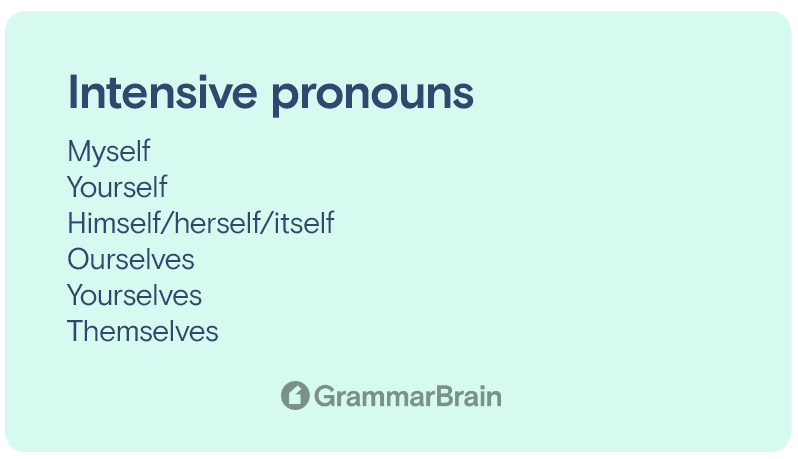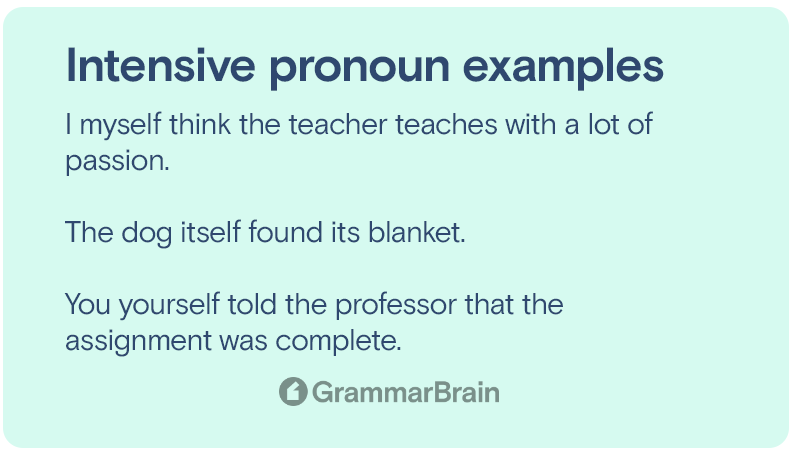What are intensive pronouns? One of the most important pieces of speech that we utilize in our sentences is called a noun. It is common practice to substitute pronouns for nouns in phrases in order to make them more concise and eliminate unnecessary repetition.
There are several distinct categories of pronouns. Let’s discuss what intensive pronouns are.

What exactly is an intensive pronoun?
The use of a pronoun that refers back to the subject of a sentence in order to highlight that subject is known as the use of an intense pronoun.
It is a sort of pronoun that ends in self or selves. It emphasizes its antecedent by referring back to another noun or pronoun that was used previously in the phrase.
This type of pronoun is called a reflexive pronoun. Because of this, intense pronouns are sometimes referred to as emphatic pronouns in some circles.
An intensive pronoun is virtually equivalent to a reflexive pronoun.
| Form | Definition |
| Intensive pronoun | An intensive pronoun adds emphasis to a statement; for example, “I did it myself.” While English intensive pronouns use the same form as reflexive pronouns, an intensive pronoun is different from a reflexive pronoun because it functions as an adverbial or adnominal modifier, not as an argument of a verb. (Wikipedia) |
What sets reflexive and intensive pronouns apart from one another?
There is a clear distinction to be made between an intensive pronoun and a reflexive pronoun.
The distinction is that intensive pronouns aren’t necessary to the fundamental meaning of a phrase, but reflexive pronouns are.
You can tell the difference between a reflexive pronoun and an intense pronoun by removing the pronoun from the phrase.
If the pronoun in question is an intensive pronoun, the sentence will continue to make sense without it. A pronoun is considered to be reflexive if removing it from the phrase causes the statement to lose all of its meaning.
List of intensive pronouns
The number of individuals to whom an intensive pronoun refers determines whether the pronoun should be singular or plural. Every intense pronoun has one of two possible endings: -self or -selves.
Singular Intensive Pronouns
When referring to only one individual, an intense pronoun is considered to be singular. The following are examples of singular intense pronouns:
- Myself
- Herself
- Himself
- Yourself
- Itself
Plural Intensive Pronouns
When it refers to more than one person or object, an intense pronoun is said to be plural. The following are the plural intense pronouns that are used most frequently:
- Yourselves
- Ourselves
- Themselves
Where did the intensive forms of pronouns come from?
The idea of intensive pronouns does not mesh well with the conventional norms of English grammar; this begs the question: why do we use them? That is mostly due to Latin’s influence.
The origin of English intense pronouns may be traced back to the Latin intensive pronoun ipso, which can be found in phrases such as “ipso facto” in Latin.
In a phrase, the word ipso can be used to emphasize the meaning of the noun facto, which means “fact,” and might signify something like “therefore.”
One illustration is as follows:
- The woman who took your car last ipso facto should also refill the tank.
How to Make Use of Intensive Pronouns?
There is just one possible application for an intense pronoun, and that is to emphasize a noun or another pronoun. However, they can show up in a phrase in a variety of various locations depending on the context.
Examine the functioning of intense pronouns via the lens of a few different examples of their use in sentences.

Examples of the use of intensive pronouns following nouns and pronouns
In writing, intense pronouns are often positioned immediately after the antecedent noun or pronoun. This positioning draws attention to the vital role that the noun plays in the verb’s execution.
- I myself think the teacher teaches with a lot of passion.
- The dog itself found its blanket.
- You yourself told the professor that the assignment was complete.
- James himself did the makeup.
- The team members themselves admitted to problems within them.
Examples of pronouns used as intensive interrogatives at the end of sentences
An intense pronoun can also be added at the conclusion of a sentence, although this should only be done if the antecedent of the pronoun is very obvious (and matches the pronoun).
When used in certain contexts, the intense pronoun stresses the idea that “This is the person who did this.”
- I’ll write this assignment myself.
- Did you imagine this painting yourselves?
- We completed the interior decoration ourselves.
FAQs
1. What are intensive pronouns?
The use of a pronoun that refers back to the subject of a sentence in order to highlight that subject is known as the use of an intense pronoun.
2. What is the distinction between reflexive pronouns and intensive pronouns?
The primary distinction between intensive and reflexive pronouns is in the roles that they play in a sentence.
3. What are the two primary categories of intensive pronouns?
Singular intensive pronouns and plural intensive pronouns are the two primary varieties of intensive pronouns.
4. What does the intensive pronoun do?
An intensive pronoun emphasizes a nearby noun or pronoun. Intensive pronouns end in “-self” or “-selves.”
Sources
- What Is an Intensive Pronoun?
- What Is An Intensive Pronoun? Definition And Examples
- Intensive Pronouns
- What Are Intensive Pronouns? (with Examples)
- What Is an Intensive Pronoun? Usage Guide and Examples
- Reflexive and Intensive Pronouns: Definition, Examples, & Exercises
Inside this article
Fact checked:
Content is rigorously reviewed by a team of qualified and experienced fact checkers. Fact checkers review articles for factual accuracy, relevance, and timeliness. Learn more.
Core lessons
Glossary
- Abstract Noun
- Accusative Case
- Anecdote
- Antonym
- Active Sentence
- Adverb
- Adjective
- Allegory
- Alliteration
- Adjective Clause
- Adjective Phrase
- Ampersand
- Anastrophe
- Adverbial Clause
- Appositive Phrase
- Clause
- Compound Adjective
- Complex Sentence
- Compound Words
- Compound Predicate
- Common Noun
- Comparative Adjective
- Comparative and Superlative
- Compound Noun
- Compound Subject
- Compound Sentence
- Copular Verb
- Collective Noun
- Colloquialism
- Conciseness
- Consonance
- Conditional
- Concrete Noun
- Conjunction
- Conjugation
- Conditional Sentence
- Comma Splice
- Correlative Conjunction
- Coordinating Conjunction
- Coordinate Adjective
- Cumulative Adjective
- Dative Case
- Determiner
- Declarative Sentence
- Declarative Statement
- Direct Object Pronoun
- Direct Object
- Diction
- Diphthong
- Dangling Modifier
- Demonstrative Pronoun
- Demonstrative Adjective
- Direct Characterization
- Definite Article
- Doublespeak
- False Dilemma Fallacy
- Future Perfect Progressive
- Future Simple
- Future Perfect Continuous
- Future Perfect
- First Conditional
- Irregular Adjective
- Irregular Verb
- Imperative Sentence
- Indefinite Article
- Intransitive Verb
- Introductory Phrase
- Indefinite Pronoun
- Indirect Characterization
- Interrogative Sentence
- Intensive Pronoun
- Inanimate Object
- Indefinite Tense
- Infinitive Phrase
- Interjection
- Intensifier
- Infinitive
- Indicative Mood
- Participle
- Parallelism
- Prepositional Phrase
- Past Simple Tense
- Past Continuous Tense
- Past Perfect Tense
- Past Progressive Tense
- Present Simple Tense
- Present Perfect Tense
- Personal Pronoun
- Personification
- Persuasive Writing
- Parallel Structure
- Phrasal Verb
- Predicate Adjective
- Predicate Nominative
- Phonetic Language
- Plural Noun
- Punctuation
- Punctuation Marks
- Preposition
- Preposition of Place
- Parts of Speech
- Possessive Adjective
- Possessive Determiner
- Possessive Case
- Possessive Noun
- Proper Adjective
- Proper Noun
- Present Participle
- Prefix
- Predicate



